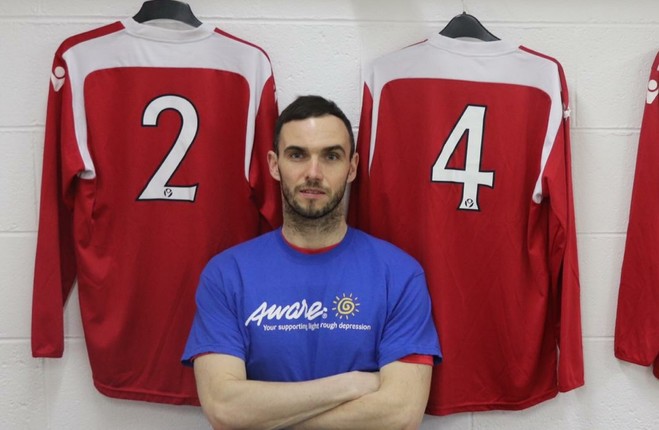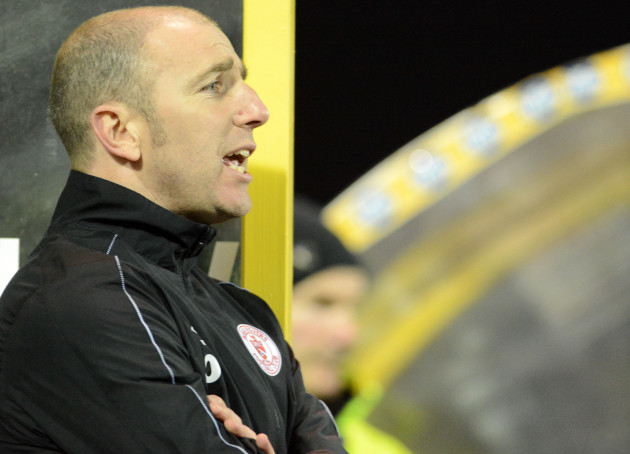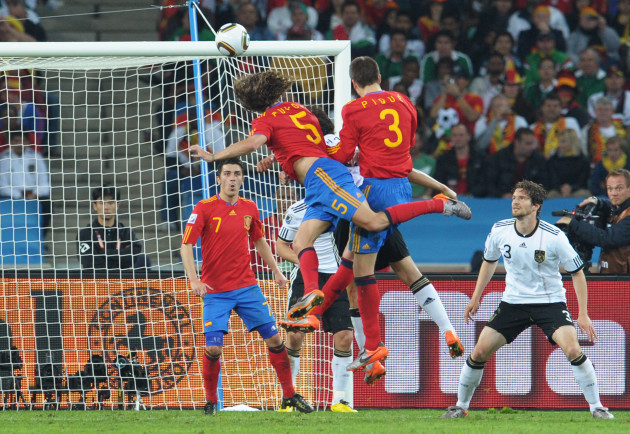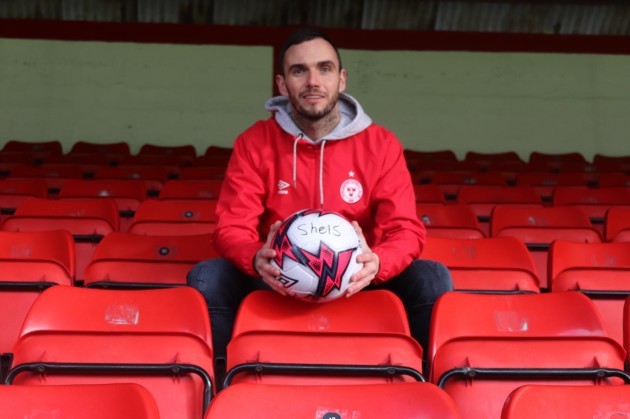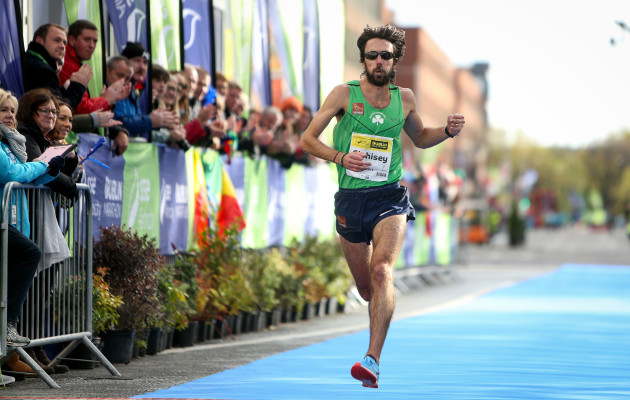ON 17 APRIL, David O’Connor was planning to run from Tolka Park to Oriel Park.
For non-League of Ireland fans, that’s Dublin to Dundalk, a journey of roughly 80km. If the traffic is very light, you can do it in about an hour by car. Walking though, takes 16 hours and 15 minutes, according to Google.
O’Connor is a lifelong Shels fan who never played at a high level but worked as a coach at the club from underage to senior level, becoming an important part of the backroom staff during the managerial reigns of both Owen Heary and Kevin Doherty.
He saw it as fitting that he would make the trip during the season that saw Shelbourne’s long-awaited return to the top flight after years in the wilderness of Irish football. Moreover, there was also significance in the fact that the Dublin club, the dominant side in Ireland during the mid-00s, who won five titles in six years, were coming up against the league’s current high achievers, who have won five titles in the last six years.
Like almost everything else in the world of sport, the game and O’Connor’s simultaneous trek has been put on hold. Nevertheless, he fully intends to plough on and complete the challenge to coincide with the match’s rescheduling once life gets back to relative normality.
Exactly why O’Connor decided to do it in the first place goes back years, to his childhood, in fact.
For his entire life, he has been affected by low mood and depression.
“What it stems from is I was bullied from school because of my appearance,” he tells The42. “I got picked on for being the chubby kid. I accepted this at the time. When you’re looking at films from America — I grew up in the late ‘80s and ‘90s — it’s always the chubby kid in these films that is a little bit goofy, a little bit clumsy, gets picked on, because he’s the chubby kid. I looked at that and I looked at what was going on with me. I thought: oh yeah, that’s supposed to happen.
I was quite introverted, quite shy, I kind of kept to myself. I didn’t really know how to stand up for myself either, which was a big problem.”
There were scarring incidents during O’Connor’s teens too — he was mugged and had a syringe held up to his neck at one point. It was only in his 20s, however, that he began to fully reflect on what he had been through.
“I started to get angry and frustrated. But I turned that anger and frustration on myself, because I was annoyed that I put up with it.
“What resulted was a period of my life where I inflicted psychological self-harm. It started off with looking in the mirror, putting myself down, telling myself I was shit. That evolved then. I started keeping a diary. I even gave it a name. I called it ‘The Hate Pages.’ I pretty much wrote on that religiously. Everything that was wrong with me. ‘Everyone else is better than me.’ It was again, just backing up these beliefs in my head that I wasn’t worth anything.
“And in my early-to-mid 20s, looking around at my friends, they’re starting to grow up, buying houses, getting married, things like that, and I just felt I was stuck in a rut. And I hid all this from people.”
In and around the time of the recession, O’Connor got a job in a bank. The pressure that came with the role at an intense time only exacerbated his problems. Getting out of bed subsequently became a challenge.
“I spent a lot of time crying and was just isolated on my own, just feeling sorry for myself, that really dark cloud. The low mood really hung over me. I remember getting to a stage where it was: ‘I think something’s going wrong here, this doesn’t seem right. Someone of my age should be enjoying life.’
“I went onto my laptop at home and Googled symptoms of depression. There was a lot of stuff coming up that seemed to match. My heart was racing looking at this. I actually deleted the history off my computer, because I was afraid someone would see it. There was such a stigma attached to it back then, that’s where we were as a nation. You look at it and laugh now — it’s like I was looking at something inappropriate.”
His parents finding out about his problems was among O’Connor’s biggest concerns.
“Everything they’d done in their lives work-wise, every stage of my life they’d been there supporting me and I was terrified I was going to let them down dealing with a mental struggle at such a young age.”
Around this time, O’Connor strongly considered attending a counselling session and even booked an appointment.
“There was a knot in my stomach. I stepped in the door. I couldn’t go in. I was terrified somebody would see me. It was such a big step with little or no information about it.
This stuff just keeps piling up and piling up. It’s not getting any better, because you’re not doing anything to make it better.
“It led me to the stage where I lost faith in people and lost faith in myself. I didn’t want to live anymore.”
The Dubliner ultimately opted to leave his job at the bank. A trip to Spain followed.
“I wanted to get out of because it was killing me — a toxic environment that was doing me no good whatsoever.
“I basically ran away from my problems. I quit my job. I went to Marbella. I told people I had this great big coaching job in Spain. I did one or two coaching sessions with a local academy and never went back. For two or three weeks, I just walked up and down the streets of Marbella on my own. I sat around coffee shops drinking coffee, texting my mates back home, pretending I was having the time of my life when I was absolutely miserable.”
He continues: “I’ll never forget it. It was the night World Cup was on. Spain beat Germany in the semi-finals. Carles Puyol scored an unbelievable header. So the place was hopping that night. Celebrations, utter noise, it was absolutely bouncing.
“I was walking back to the hostel with my head down, ignoring it all. I gave up on myself, went back to my room, the only thing on my mind was: ‘I don’t want to live anymore.’
“To say that 10 years on, it’s still quite difficult to articulate, but that’s where I was. Back in my room, on my own. I got very irritable. I started moving the bed around, moving the locker around, opening the windows, closing the windows, I didn’t know what to do. I had all these thoughts in my head. I had to tape up the door and the locks and everything. I thought: ‘I’ll just go asleep and hopefully I won’t wake up.’ That’s where my mind was, how far I’d gone.
“The lady who owned the place walked by the room and knocked on the door, which she had never done in all my time there. She may have heard the commotion, I’m not too sure.
“She looked at me and I burst into tears in front of her. I didn’t tell her the full story. But she said: ‘Sit down there, we’ll get you a cup of tea.’
“For someone who was a stranger, she showed incredible compassion, and I’ll never forget that. Her timing couldn’t have been any better.
“I had a little bit of a chat with her. She was like: ‘Look, you need to get home to your family.’”
While O’Connor felt better upon returning to Ireland, his problems hardly diminished. The supposed coaching job, he told friends, just “didn’t work out”.
By now, it was the height of the recession and jobs were difficult to come by.
You’re watching your mum and dad get every day for work. I’m unemployed thinking: ‘Oh my God, I’m not contributing here.’ So that was adding to my hurt [along with] the inner torment for everything I was still dealing with.”
Two years later, O’Connor was feeling just as disillusioned as he had been in Spain and once again, it led to a situation where he planned to end his life.
“These things, you can only give them a shallow grave, they resurface very soon.
“The attitude I had was, I didn’t want to live anymore. That’s where my headspace was. There was a lot of rage inside me. Again, I got that irritable feeling.”
But this occasion proved to be a turning point.
“I remember looking at it and saying: ‘I have spent the best part of seven years psychologically tearing myself asunder — a real conscious effort to ruin myself internally.’ It was so deliberate. The effort I was expending was so negative.
“Over the course of a couple of months, I started thinking: ‘What if I found a way to work on myself in the opposite direction, to find more of a positive way to work on myself, even halfway back, I’d be in a better place?’ It was the first time ever I’d looked at myself and thought: ‘Jesus, I’ve never done anything to make myself better. So there’s no surprise as to why I’m here.’
“There was fight in me saying ‘there’s another way’. If I truly thought it was the end, I figured I might be a bit more accepting of the situation.”
Confiding in his close friend Dave Curran proved crucial.
It was the middle of the summer, we walked the street for most of the night and had a good old chat — plenty of laughs, plenty of tears. Just that one conversation with someone to get over a decade of hurt out of me, I can’t describe how much that took off my shoulders.
“It wasn’t the silver bullet. It didn’t solve everything. But it just gave me a little bit of perspective to get it out of my head, give it to somebody else and just get their opinion. Because I’d never done that – I’d never asked for help, I’d never spoken to anybody.”
Although he is feeling better now, O’Connor is keen to emphasise the recovery is ongoing. He agreed to take counselling sessions after that pivotal conversation and has been attending them on and off ever since. Over the years, he feels he has become more self-aware, assertive and compassionate. Writing blogs and communicating via social media has helped him get his life-affirming messages across.
“I started connecting with other people. It was the first time I’d acknowledged or respected or realised really that other people were going through similar things. Everyone has a struggle.
“Everybody’s going to have something either emotionally or intellectually that they’ll be stumped on. The smallest thing can become the biggest problem.
“We’re also all going to lose somebody growing up or at some stage of our life. If that’s not handled correctly, it could spiral into other areas of your life and be really debilitating. There are going to be moments in our lives that will knock us back a bit.”
In the many years since he started to properly address his problems, one moment that stands out is January 2019.
“I hit a real bad low. It was probably the worst since 2012. From January to March was quite difficult.
“But this year, come January, I thought: ‘No way am I letting that happen again.’ So I was in a good place, but I booked a load of counselling sessions.
“So just being proactive about it, rather than waiting until I was in a bad place [was important].
“Since January, I’ve been going to counselling and using social media platforms to try to detail those experiences, trying to normalise them. I’m going to a counselling session and saying it in the same way I would be if I was going to the gym, or running.”
As part of his recovery, O’Connor has been undertaking a series of endurance challenges. The Oriel Park walk is a fundraiser for Aware Ireland. His overall aim is to raise €100,000 for various mental health organisations throughout Ireland, and he has managed around a quarter of that tally so far.
The events he has been involved in have included running 10 marathons in 10 days on an athletics track (260 miles/1055 laps), running 247km in one weekend around Dublin, cycling 200km from Cork to Wicklow on a child’s BMX and climbing Lugnaquilla (the highest peak in Leinster) with 55lbs on his back. Many of these challenges symbolise mental health struggles — the heavy load accompanying him on the mountain climb, for instance, represented “the burdens we carry on our minds and the pressure we put ourselves under every day”.
O’Connor takes inspiration, not from international superstars, but from Irish athletes like Ciara Mageean, Mick Clohisey, and naturally, some Shels favourites such as Lorcan Fitzgerald, Dean Delany, Rachel Graham and Pearl Slattery.
Now 36 and based in Artane, O’Connor says opening up to his parents — the thought of which once terrified him — is no longer an issue.
“The biggest thing when I did speak to them was telling them that ‘this is not your fault’.
“For the Aware 10 in 10, everyone was running with me. And for the last lap everyone was sent off to run on their own.
As soon as I crossed the finish line, the Shels kit man, Johnny Watson, he was standing there with the club’s jersey with number 10 on the back for me. He handed me that, and gave me a hug. I turned, saw me ma and da, and I just burst into tears. I looked around me then and everyone was in tears. It was such a poignant moment. I felt at the time, it was like me apologising to them.
“When I re-framed that [in my mind], it was like: ‘No, that wasn’t an apology.’ All it was was love. I was giving love back that I felt I hadn’t given them growing up and through my 20s.
“It was a beautiful moment, quite remarkable and something I’ll never forget. I know I could sit down now with anyone in my family, chat to them about anything, and not feel shame about it.”
Another important moment for O’Connor came during the 247km challenge, as he found himself struggling badly, having not even reached the event’s halfway point.
“I ended up stopping and thinking ‘I can’t get through this’. It took me a good few minutes to get going again. Five minutes later, I could have sprinted the whole thing, it was quite remarkable, and it’s a nice metaphor for life. Don’t define yourself in one bad moment. Had I decided to pack it in, I never would have known that in five minutes’ time, I’d have felt alright.”
For more information, you can follow David O’Connor on Instagram – @performance_doc
Need help? Support is available:
- Samaritans 116 123 or email jo@samaritans.ie
- Aware 1800 80 48 48 (depression, anxiety)
- Pieta House 1800 247 247 or email mary@pieta.ie (suicide, self-harm)
- Teen-Line Ireland 1800 833 634 (for ages 13 to 19)
- Childline 1800 66 66 66 (for under 18s)
The42 is on Instagram! Tap the button below on your phone to follow us!
